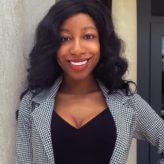It’s been almost a year since the murder of George Floyd in police custody, but I remember the weeks that followed as if it were yesterday. There were protests and demonstrations across all 50 states and it seemed as though the Black Lives Matter movement was more discussed than I had seen in the past. Nevertheless, amidst the intense protests, polarizing Facebook debates, and political discourse, one thing that stuck out to me the most was the hypervisibility that I felt during those weeks.
During summer school, the first five minutes of class felt like there was an elephant in the room that needed to be addressed. Professors continuously held space for us students to let out our feelings. Sometimes the heaviness was so strong that there wasn’t much to say, but the looks of both worry and empathy seeped through the Zoom screen as everyone took a step back to listen as the Black students in the class shared our innermost thoughts. And the hypervisibility didn’t stop at Zoom meetings for class. There was even a widespread response on social media for accounts to use the #AmplifyMelanatedVoices hashtag, which gained traction with over 235.6k posts within the first month, to uplift the voices of BIPOC (Black, Indigenous, and people of color) creatives and businesses.
Different podcasts, organizations, and businesses even reached out to me to propose collaborations centering the topics of how the Black Lives Matter movement influences my career as a sex blogger and future sex therapist and how it’s especially important to be in this field as a Black woman , spreading messages of sexual freedom and sex positivity.
Growing up, resources and representations of navigating sexuality as a Black woman were slim to none. On the rare chance that there was representation, it was confined to traumatic experiences and harmful stereotypes. At the same time, it was common to see people within my own community use respectability politics to label young women in particular “grown” or “fast” for any act or sign that might appear too sexual for their liking.
By taking up space in conversations about sex, I wanted to show that Black sexuality is powerful, and that there’s a sense of freedom that comes with radically embracing our bodies, sensuality, and eroticism. Black people have always been viewed by white people with both amazement and disdain because of our bodies. Historically, we were stolen, assaulted, and used as if we only existed for other people’s entertainment and consumption. And despite all of this, we now dare to show that we’re more.
We dare to dream, reimagine, and fantasize about what living a free and sexually liberated life means for us. Sexual freedom may look different depending on the person. Some may feel empowered by abstaining from sex to focus on their life goals. Others may feel more empowered by reclaiming sexual slurs that are specifically aimed at marginalized communities (i.e. “hoe” and “thot”). Regardless of how sexual freedom looks for us, we continue to embrace our sexuality and our bodies because our pursuit of pleasure and empowerment shouldn’t equate to sacrificing our humanity.
Sexual freedom fits into the Black Lives Matter movement because Black lives matter beyond conversations about Black pain and survival. It is also about showing that our society actually gives a damn about our holistic experiences. It is about releasing the Black body from shackles of suppression and exploitation disguised as visibility. It is about self agency and being unapologetically who we are, without fear of being confined to a box.



